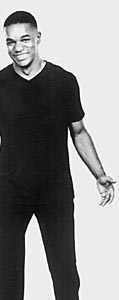![[Metroactive Music]](/music/gifs/music468.gif)
[ Music Index | San Jose | Metroactive Central | Archives ]
Vibe Jibe
For vibraphonist Stefon Harris, good vibes are all about listening closely to the music
By Marianne Messina
WHEN HIS SECOND CD, Black Action Figure, came out, vibraphonist Stefon Harris said he never wanted to do the same thing twice. Between that album and his debut, Red Cloud of Dust, Harris certainly kept his word. And now, with a Grammy nomination in his pocket for Best Jazz Instrumental Solo (Black Action Figure's "There Is No Greater Love"), and a Vibist of the Year title from the 2000 Jazz Awards, Harris tours, jams, reads Rumi, studies physics and is halfway through his third CD. No, it will not re-visit or "individualize" Lionel Hampton, Red Norvo, Milt Jackson or Bobby Hutcherson. Amid a shifting focus that seems to be coming up from the younger ranks of jazz musicians, not so much devaluing "the masters" as re-valuing "the self," Harris is composing his own jazz suite that he hopes will, as he puts it, "bring together all the things that are happening in my life." He is thinking of calling it "Unified Field Theory."
Still in his 20s, Harris is something of an anomaly in the jazz world. He studied classical music in college, but a funny thing happened on the way to the New York Philharmonic: Harris met the music of Charlie Parker. At that time, in almost Einsteinian fashion, Harris "didn't play well enough to get into the jazz program," yet within a few years he had played with Max Roach, Wynton Marsalis and Joe Henderson, and had appeared on a dozen recordings.
Jazz critics who often assume that writing is never going to be the primary attribute of a good jazz player portray Harris as an instrumentalist with incidental personal style. But Harris sees himself as primarily a composer whose instrument and training are simply the tools he's most comfortable with, tools that help him "break down that door" and get to "the magic that already exists," the music. "Music literally talks to you," Harris says, "when you're humble; when you're all about listening." With awe, he recalls a session he had with Wes Anderson, "I just was not thinking. I was able to put my consciousness aside." But then he reflects, in all humility, that he doesn't like to single out any particular performance. "It's a matter of perspective. There's always something beautiful that happens."
The title Black Action Figure smirks with Harris' quiet, light sense of humor. You can hear it in his playing, in the capricious melodies of "There Is No Greater Love," in the rhythmical bravado of "Conversations at the Mess" or "Feline Blues." However, true to Harris's career plan, his upcoming CD heads in a completely different direction. Culled from his readings in classical Persian poetry, his philosophical meditations, his interest in physics, and from life, Harris' forthcoming suite "raises issues about the differences between life and death--if there are any differences." In discussing one movement of the suite, Harris muses, "How do you express slow death that creeps up on you like a whisper?"
It's an off-the-cuff question, yet its eloquence shows promise for Harris the nascent poet. "I wrote a poem for the first time--actually three poems," he reports. Until now, Harris feels his music has been cordoned off from his other pursuits. He's moving in a direction to change that, to bring all his explorations under one artistic roof. Perhaps, he suggests, we may even see Stefon Harris poems in future liner notes.
[ San Jose | Metroactive Central | Archives ]
Copyright © 2000 Metro Publishing Inc. Metroactive is affiliated with the Boulevards Network.
For more information about the San Jose/Silicon Valley area, visit sanjose.com.
![]()
 Suite Notes: Stefon Harris is currently channeling his talents and many interests into composing a jazz suite.
Suite Notes: Stefon Harris is currently channeling his talents and many interests into composing a jazz suite.
Stefon Harris will be playing two shows on Thursday (Sept. 7) at 8pm and 9:30pm, at Club Ibex, 55 S. Market St, San Jose. Tickets are $15. (408.971.4239)
From the August 31-September 6, 2000 issue of Metro, Silicon Valley's Weekly Newspaper.